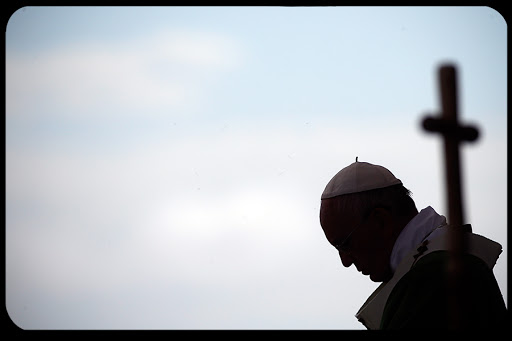Our visit to Assisi was, as I expected, a delight and a disappointment. We arrived on a Sunday morning and the famous town was crowded with tourists, weekenders and pilgrims. The basilica was so packed with Mass goers that we decided to miss the famous frescoes and went instead to celebrate Mass in the peace chapel just a few yards from the tomb of St. Francis. While visiting Assisi I was reminded of three famous characteristics of St. Francis, and was moved to see them reflected in the life and ministry of Pope Francis today.
First, St. Francis is famous for his love of poverty. As he realized he was being elected to the papacy, Cardinal Bergoglio’s friend, the Brazilian Cardinal Claudio Hummes, leaned over and whispered, “Don’t forget the poor.” Taking the name “Francis” the pope has made remembering the poor a hallmark of his papacy. Pope Francis’ attention to the poor has extended beyond welcoming the homeless to lunch, providing showers and a shave to the destitute and visiting prisons. It is his passion for the poor that also leads Francis to criticize unfettered capitalism, a global economic system that hurts the poor and working conditions that deprive the poor of freedom and choice.
Why does Pope Francis so faithfully uphold the Catholic faith’s “preferential option for the poor?" Not only because the poor need assistance, but because there is a spiritual lesson to be learned from the poor. The Catholic church does not teach that there is virtue in poverty for its own sake. However, when we are poor we know we are in need, and only when we know we are in need can we call on God who fulfills our deepest needs. Pope Francis’ prophetic pointers remind us that even the rich suffer from a kind of poverty: they are spiritually impoverished if they have made money their god.
The second trait for which St. Francis is famous is his love of nature. His canticle to the sun, his preaching to birds and taming of a wolf wins admirers of all faiths and none. St. Francis’ love of nature is reflected in Pope Francis’ encyclical Laudato Si. From the beginning the pope reflects on St. Francis’ joyful spirit and calls the world to a fresh understanding of the stewardship of creation.
Saint Francis of Assisi reminds us that our common home is like a sister with whom we share our life and a beautiful mother who opens her arms to embrace us. "Praise be to you, my Lord, through our Sister, Mother Earth, who sustains and governs us, and who produces various fruit with colored flowers and herbs.” This sister now cries out to us because of the harm we have inflicted on her by our irresponsible use and abuse of the goods with which God has endowed her. We have come to see ourselves as her lords and masters, entitled to plunder her at will.
In Laudato Si Pope Francis takes Saint Francis’ love for nature and uses it to connect with a world suspicious of religion, but passionately concerned about the destruction of the natural world. In doing so he takes the concern for the environment to a deeper and more human level. He points out that one cannot be concerned for the natural environment without being equally concerned about the suffering of the poor, the destruction of the unborn, the abuse of children, the loneliness of the elderly and the dangers of unrestrained technoscientific progress.
As in his concern for the poor, Pope Francis’ concern for the natural world has a deeper spiritual meaning for humanity. At the end of his encyclical Pope Francis calls for a Franciscan type of mysticism in which the contemplation of nature leads to the contemplation of the creator.
“At the end, we will find ourselves face to face with the infinite beauty of God, and be able to read with admiration and happiness the mystery of the universe, which with us will share in unending plenitude… Eternal life will be a shared experience of awe, in which each creature, resplendently transfigured, will take its rightful place…In the meantime, we come together to take charge of this home which has been entrusted to us… In union with all creatures, we journey through this land seeking God, for “if the world has a beginning and if it has been created, we must enquire who gave it this beginning, and who was its Creator.”
Finally, Pope Francis reflects the life and ministry of St. Francis in his ability to preach through significant and prophetic gesture. In a recent interview his secretary, Archbishop Georg Gaenswein has observed that this is one of Pope Francis’ greatest strengths. Whether he is embracing a disfigured man, washing the feet of prisoners, choosing to live in the St. Martha’s hostel or visiting a shanty town, Pope Francis shows the gospel in action and so speaks a language without words that crosses cultural and language boundaries to touch millions.
St. Francis is loved by both Catholics and non-Catholics alike because his life too, was one of significant and prophetic action. He was a poet and prophet through the simplicity of his life, the power of his example and the witness of his action. This too has a deeper spiritual significance because at the heart of the Christian message is the truth of the incarnation: that God himself revealed his truth not primarily through a book or a speech, but through a historical person. Jesus Christ was God’s significant gesture—the Word made flesh.
St. Francis lived these three principles and through the miracle of a church which is ever ancient and ever new, Pope Francis brings alive today at the beginning of the 21st century the truths brought to life by Francis of Assisi nearly 800 years ago.
Follow Fr. Dwight Longenecker’s blog, browse his books and be in touch at dwightlongenecker.com

